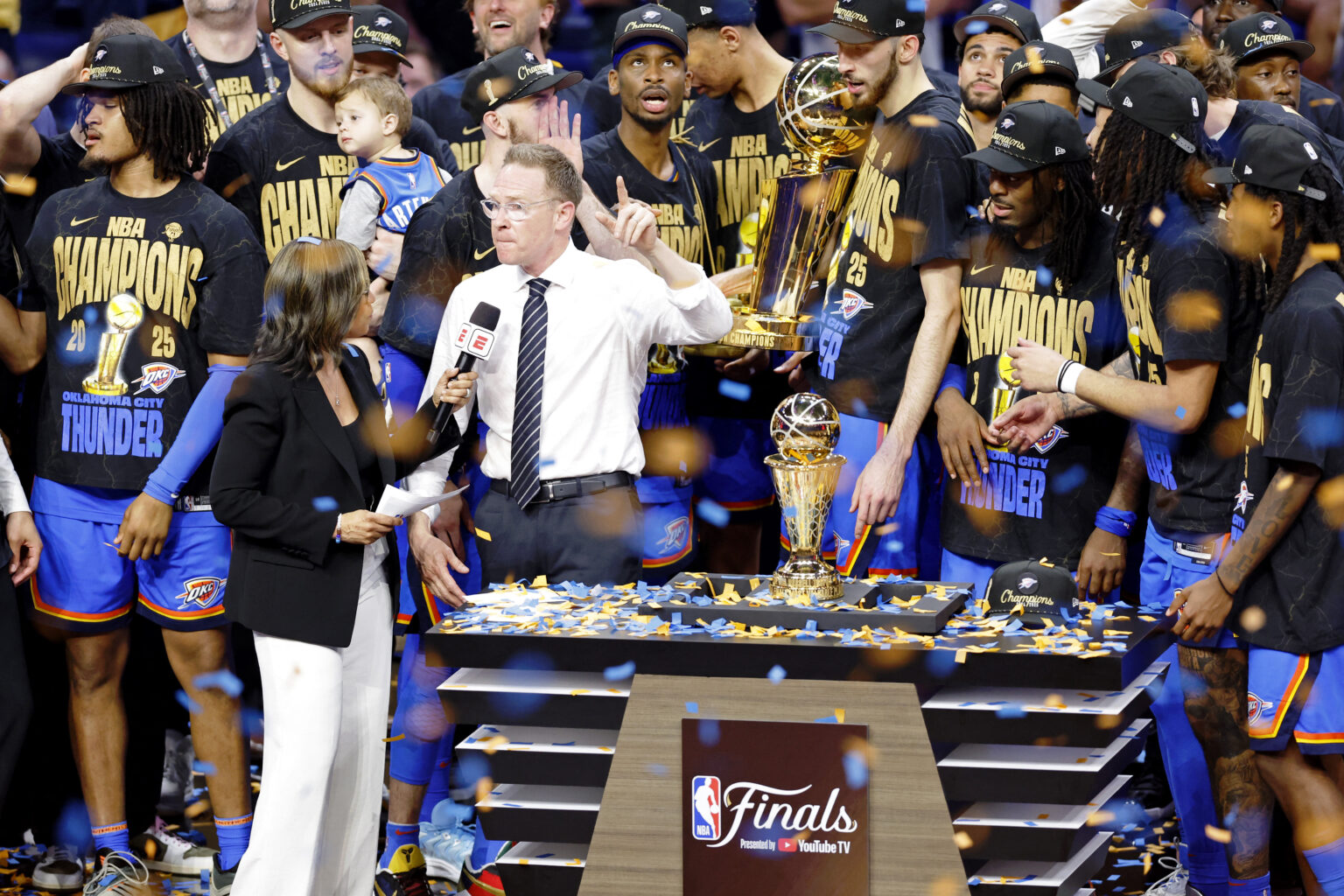Emerging Trends in NBA Leadership: Lessons from the Thunder’s Successors
Currently, the Oklahoma City Thunder are riding a wave of optimism and achievement. Having recently secured an NBA championship, the franchise boasts a roster with an average age under 25 among its top players and holds the league’s largest pool of draft assets. These factors position the team as a formidable contender and a model of strategic planning in the league.
Such accomplishments have rightfully earned Sam Presti, the Thunder’s general manager, the accolade of NBA Executive of the Year. Presti’s track record extends beyond this recent triumph; he previously orchestrated the assembly of a championship-caliber squad by selecting future MVPs Kevin Durant, Russell Westbrook, and James Harden through shrewd drafting.
Building a Legacy: The Presti Coaching Tree and Its Impact
In the competitive landscape of professional sports, successful front-office strategies often inspire imitation. Since 2010, the Thunder has been a fertile ground for cultivating executive talent, with a league-leading five of its former staff members ascending to roles as general managers elsewhere. Notably, two of these alumni now lead prominent teams: Michael Winger and Will Dawkins, both at the helm of the Washington Wizards.
Michael Winger, previously the Los Angeles Clippers’ GM, served as the Thunder’s assistant general manager and legal counsel from 2010 to 2017. During his tenure, the Clippers posted a commendable 272-200 record and made four playoff appearances, working under the guidance of basketball operations president Lawrence Frank. Meanwhile, Will Dawkins, who rose from an intern to vice president of basketball operations over 15 years with the Thunder, now plays a pivotal role in shaping the Wizards’ future.
Evaluating the Track Records of Presti’s Proteges
Rob Hennigan: A Cautionary Tale from Orlando
Rob Hennigan’s journey from the Thunder to the Orlando Magic exemplifies both the potential and pitfalls of NBA management. Hennigan, who joined the Magic as GM in 2012 at just 30 years old, became the youngest person to hold such a position in league history. Despite his youthful enthusiasm, his tenure was marked by struggles, with the team failing to reach the playoffs in five seasons and posting a cumulative record of 132-278.
Hennigan’s early moves included trading away franchise star Dwight Howard, which yielded a decent return in Nikola Vucevic. His draft selections, such as Victor Oladipo and Aaron Gordon, showed promise, yet his overall strategy lacked consistency. A significant misstep was the 2016 trade involving Oladipo, Ersan Ilyasova, and the No. 11 pick (which became Domantas Sabonis) for Serge Ibaka. The subsequent trade of Ibaka to Toronto for Terrence Ross and a late first-round pick further diminished the trade’s value. These decisions culminated in a series of underwhelming seasons, with the team unable to sustain its brief playoff success.
For the Wizards, the lesson is clear: meticulous talent evaluation and strategic patience are essential. While the trades for stars like Paul George and Shai Gilgeous-Alexander paid dividends, earlier miscalculations underscore the importance of developing a balanced roster rooted in sound draft and trade decisions.
Rich Cho: Navigating the Challenges of Building a Competitive Franchise
Rich Cho’s management career spans multiple teams, including brief stints with the Portland Trail Blazers and a more extended period with the Charlotte Hornets. His tenure in Charlotte, from 2014 to 2018, saw some notable successes, such as drafting Kemba Walker and acquiring reliable role players like Nicolas Batum. However, Cho’s inability to find a complementary star to Walker and his repeated first-round misses-selecting players like Michael Kidd-Gilchrist and Cody Zeller-hampered the team’s growth.
The Hornets’ inability to build on their 2015-16 playoff appearance, coupled with questionable trades like the 2016 first-round pick for Marco Belinelli, highlighted strategic shortcomings. These missteps contributed to a decline in performance, with the team missing the playoffs in subsequent seasons. For the Wizards, the takeaway is the importance of aggressive talent acquisition and the need to operate with a long-term vision rather than settling for incremental improvements.
Troy Weaver’s Rebuilding Strategy in Detroit
Since taking over as Detroit Pistons GM in 2020, Troy Weaver has faced a rebuilding process that initially yielded disappointing results, with no playoff appearances and a cumulative record of 74-244. Nevertheless, Weaver’s strength lies in his talent evaluation, particularly in the draft. His selection of Cade Cunningham with the first overall pick in 2021 marked a turning point, setting the foundation for a potential playoff resurgence.
Weaver’s draft strategy also included selecting promising prospects like Ausar Thompson and Jalen Duren, who have contributed significantly to the team’s recent progress. However, his overemphasis on big men and athleticism-often at the expense of shooting and versatility-has been a point of critique. Additionally, his difficulty in securing multiple first-round picks and his struggles with coaching stability, including a brief tenure for Monty Williams, underscore the complexities of franchise rebuilding.
For the Wizards, the lesson is to leverage all avenues-drafts, trades, free agency-to maximize roster flexibility and talent depth. Embracing a comprehensive approach, as Weaver has, can accelerate the path from rebuilding to contention.
Strategic Takeaways for the Wizards’ Front Office
The experiences of these former Presti protégés highlight several key principles for effective NBA management:
- Prioritize talent evaluation and development: Building a sustainable contender hinges on identifying and nurturing young talent through the draft and player development programs.
- Operate with strategic ambition: Don’t shy away from bold trades and signings that can elevate the roster, even if it involves taking calculated risks.
- Balance short-term gains with long-term vision: While immediate success is desirable, sustainable growth requires patience and a clear plan.
- Utilize all available resources: Engage in trades, free agency, and draft capital to create flexibility and maximize team potential.
As the Wizards look to ascend the ranks of the NBA, studying these lessons from the careers of former Presti associates can provide valuable guidance. Embracing a comprehensive, forward-thinking approach will be crucial in transforming potential into sustained success on the court.

